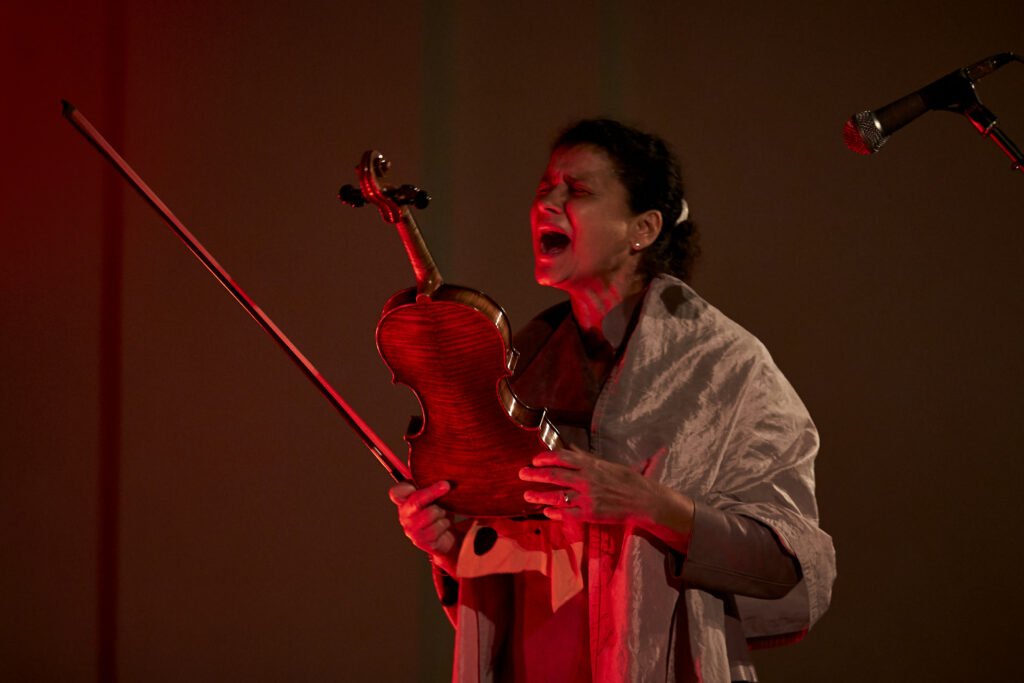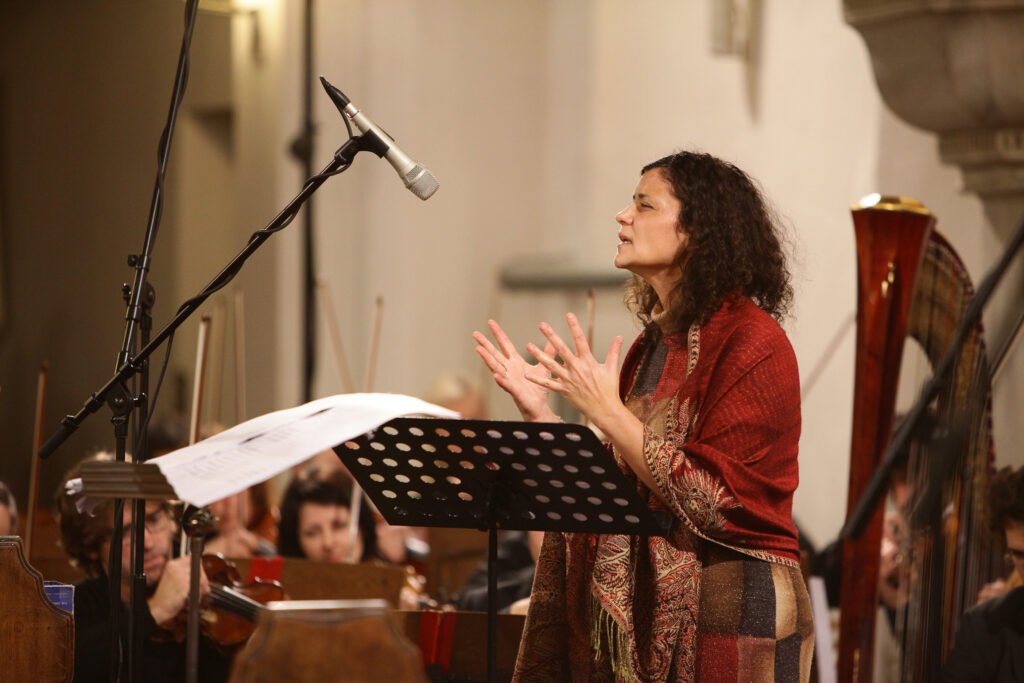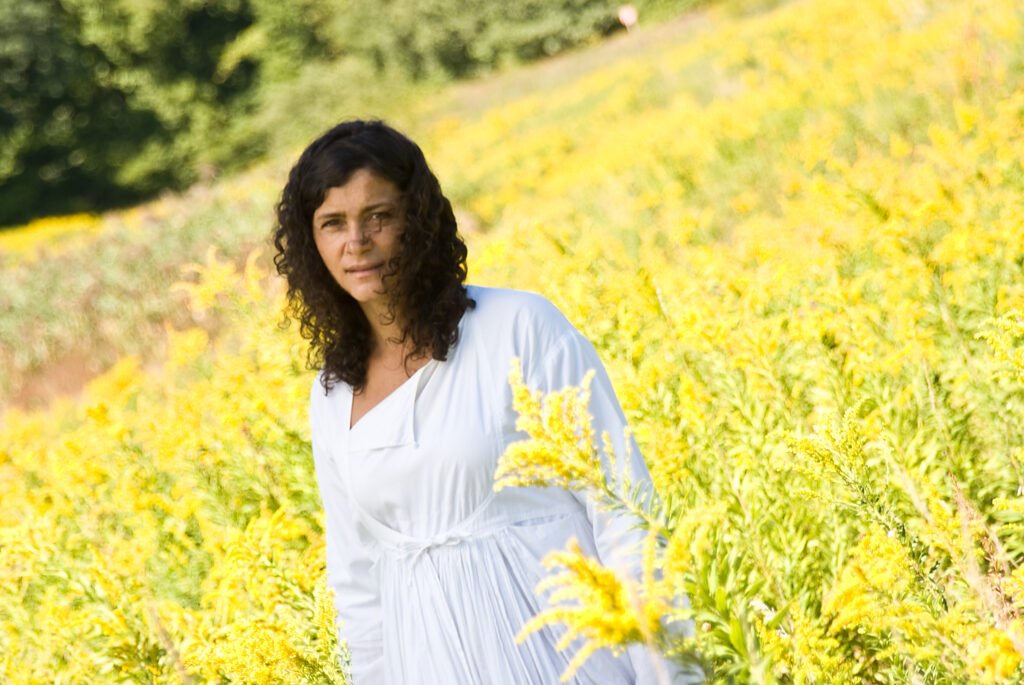Iva Bittova is a Czech singer, violinist, and composer known for her innovative and eclectic approach to music. Bittova began playing violin at the age of six and studied at the Brno Conservatory. She later became involved in the avant-garde music scene and collaborated with a variety of musicians and artists, blending elements of classical, folk, and experimental music in her work. Bittova’s distinctive style and powerful voice have earned her critical acclaim and a devoted following around the world.
This week she is visiting Tou, hosting a master class vocal workshop, and also performing together with the award-winning Slovakian-Norwegian orchestra Angrusori. We had a chat with her over a cup of coffee:
It is nice to welcome you here in Stavanger right before the concert with Angrusori. You have been to Norway before, in fact you have been to the Nordics quite a few times?
Yes, I have been travelling here a lot in the 80s and throughout the 90s, when I was just exploring and performing at various festivals in the whole Europe. I don’t have any manager, so each time I get an invitation to perform, I plan everything myself. I have visited each Scandinavian country and it is always nice to come back. I notice there are different cultural traditions but at the same time I feel like people here really have a sense for classical, traditional and jazz music, and I like that.
Can you tell about how the Angrusori project started?
That feels like such a long time ago… I think I got an invitation to take part in this new project between the Norwegian Kitchen orchestra and the Slovak musicians, and I did not know any of the bands from before. It was all very new to me but I was open to it. It was especially interesting for me because I actually have a connection to the Roma culture – my father’s grandmother was Roma. I cannot speak the language, but the culture was always something I could relate to.
Would you say the Roma roots contributed to your professional development?
When I was 17, I was invited to perform in a Slovak movie and play a gipsy girl. In order to prepare myself for the role, I spent quite some time with the Roma people and I simply fell in love with the songs they performed. I did not know what the songs were about, because I did not understand the language, but it is very similar to how I work in general; if I don’t have the lyrics or I don’t know the words, I still have a feeling of what the song is about, what the main message is and I am using my own onomatopoetics.
I like to work with many different languages, even if I cannot actually speak them, because each language has its own melodic features, sounds, pronunciations. It also allows me to explore a certain space between the lines, or a meaning that is more hidden and not flat. I also use elements of Roma music and songs in my workshops with students because there is a lot of meaning and emotions, but at the same time they are very simple and down to earth.

What else impacted your artistic journey and finding your own style?
In my family there was a mix of Moravian and Slovak music tradition, because my mother is from Moravia and my father was born in Slovakia, but spoke mostly Hungarian language. My father was a professional double bass player in an orchestra, so we were listening to a lot of classical and jazz music, and many different styles. It was a long journey discovering my own style, but my father always said that I did not have to imitate anyone else, I have a talent and I am able to develop my own creative expression. I played violin since I was 7, although it was not always easy. When I was 22, my father was struggling with health issues and at some point, I realized that I wanted to follow his spirit and started adding vocals. My father had a chance to hear two of my first compositions before he died.
In addition to that I was about to give birth to my first son. I was practicing around 9 hours a day at the same time, because I wanted to surround my baby with the music. It was an emotional time because I knew I could not do anything to help my father and I had to focus on my own kid coming to the world, keep my strength and energy. So professionally it was a time that I started exploring different corners of classical music, eliminating borders and looking for new possibilities.
Overseeing borders is essential also in the Angrusori project. How did you find the cooperation between the musicians with such different backgrounds?
If you look at a typical Norwegian and a typical Slovak Roma person – their appearance is completely different, the way they speak, act, interact is different. But the music is something that brings them together and makes a close connection; and you can create something very special out of that. Music is their common language that they can communicate in. This is what’s so special with the Angrusori project – it is such a crazy and wild mix between these seemingly totally different people who find this kind of common language. If people are open and they like to explore and make music with others, there is always a way to communicate and understand.
It is also what I say to my students: to play together with other musicians is like learning a new language. Not only in a sense that you learn the culture and backgrounds of each other, but also get a chance to grow together and bring a new chemistry.
In this case, Kitchen orchestra is a group of people who are professional and educated. The Roma people are from the village, with no education, but music is like bread for them, they live it. And me, I think I am kind of in between them, I feel like I am a bit on both sides. Because I am travelling so much and doing many different things, I can improvise and adapt. From the beginning until now we are still growing together and learning new things, working together has been a major inspiration for all of us.
Can you pick an example of these learnings?
Well, we always want to refresh the program for each time we perform, which means we need to communicate on how we will do it. In the beginning the language needed to be translated, because people could not really understand each other. But because of working together over the years, we don’t need to translate that much anymore, because they start to understand each other’s expectations and wishes. Even the Norwegians were saying that they don’t have to be so critical and professional all the time, they can loosen up a bit. I am witnessing and enjoying this process. I think it is a lot about growing trust and agreement.
What is important for you as an artist? Where do you get your inspiration and motivation from?
After many years performing actively, I find that the most important thing for me is contact with the nature, to be still and present in the moment. That way I know what I should allow to enter my life, be it emotions, people, experiences. Because I am absorbing all those things, transforming them in a way and giving back to people as I perform. I have to select the things that I need to grow stronger and better. Not always I succeed in this, but it always is a learning experience.
I get also very much affected by what comes from the audience, I try to stay present and invite the listeners to go on a journey. I am very sensitive to the immediate feedback I get from the audience, and I like to play with the reactions I get and it becomes part of the performance.

So, in a way, you are inviting the listeners to participate in the performance?
Yes, and I even know that there are listeners that come to my concerts for all the 44 years that I am touring, and they say that each single time the experience is different.
I know I could be working more on recordings, but I feel like I need to play for live audience, because I just get some much back. It is something that balances me, and it is my way of communicating. It is something beyond words, it is a feeling that I get, an immediate response that I find magic. Accessing this different level is also something that I teach my students.
It sounds exciting, but how do you explain that to your students?
You know it is something that we could all do easily when we were kids. It is something we still can do when we are curious, spontaneous, do things immediately, without thinking too much, and welcome the surprises we get. I don’t think it is possible to explain it in words, it is simply something you do and practice.
How would you describe your audience?
It is very mixed, much depending on the venue. It can be classical in many cases, but also people who like folk, experimental, jazz music. I am glad that it is not only older people, the younger generation also comes, which is very refreshing and important for me.
I am also working very much with both dancers and painters, and there is a lot of space for imagination and improvisation. So it is not only crossing musical borders but artistic ones in general.
You must travel a lot with all the different projects you are involved in? How does the near future look like for you?
Oh yes, a lot of travelling, which has become a bit more exhausting lately. There will be more concerts with Angrusori several other places in Norway and later in Slovakia, as well as Cheltenham Jazz festival in the UK. In April, I will be performing with dancers in Brussels and performing Karl Jenkins Stabat Mater in Brno, in addition to doing vocal workshops.
So what do you do when you get a free minute?
Cleaning and gardening. And spending time in the woods!

All photos: bittova.com
